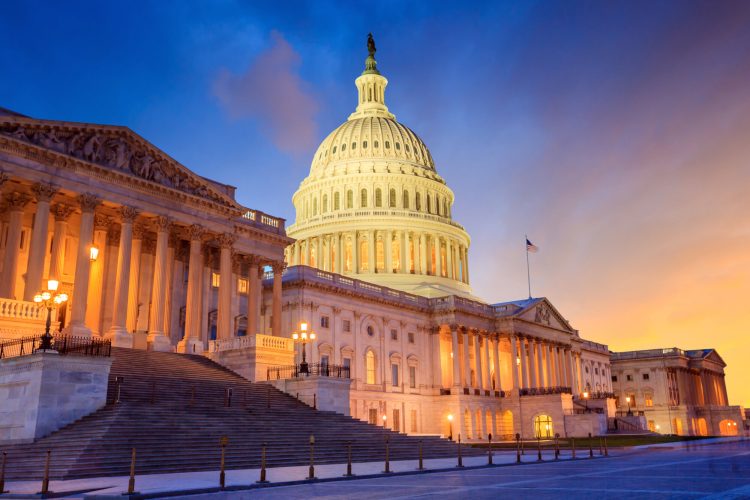This week on Facing the Future, we plowed through the ‘Wintry Mix’ contained in the December jobs report put out by the U.S. Bureau of Labor Statistics and its implications for the economic outlook and the 2022 Congressional agenda. Our guest for this program was Gordon Gray, Director of Fiscal Policy at the American Action Forum. Also joining the conversation was Concord Coalition Policy Director Tori Gorman. Concord’s Chief Economist Steve Robinson later joined Tori and me for a discussion on what the jobs numbers, combined with inflation, mean for the economic picture and whether rising COVID cases will prompt Congress to pursue another COVID relief package.
Gray described the December 2021 jobs report as a wintry mix because while it showed disappointing and below expectations job gains of 199,000 overall, the unemployment rate dipped to 3.9% and there are other factors showing a stronger labor market than meets the eye.
“There are some very good things in this report,” said Gray. “The household employment survey showed strong job gains on the order of nearly 600,000 jobs. When the pandemic hit in the spring of 2020, we lost about 22 million jobs that March and April. Clearly, the forward facing lower income service jobs – waiters, bartenders, leisure, and hospitality – got absolutely walloped. They lost about 8 million jobs, and that sector has gained back about 7 million of those jobs lost. There have been broad based gains across industries. When I look at the composition of the workforce now, I am actually very encouraged by how broad based those gains are and the degree to which these service workers have found jobs and found them in a context of rising wages.”
But while wages are rising, so is inflation, with the latest figures showing inflation rising 7.0% for the year in 2021, its highest level in the United States since 1982. Gray says this complicates the evaluation of the economy and the labor market.
“Real earnings are actually down 1.9% over the year. For production and non supervisory workers, wages are down 1.6% for the year. So fundamentally, even though nominal earnings gains for employees have been strong, inflation has outpaced them,” said Gray.
Gray says the strengthening economy on jobs and wages, coupled with rising concerns about inflation may give Democrats in Congress the motivation to pass some version of President Biden’s signature domestic legislation, the Build Back Better Act. It may not pass as a whole package, Gray says, and may need to be broken up into parts in a way that will accommodate the fiscal concerns of West Virginia Senator Joe Manchin, whose vote is needed for passage.
“You have budget reconciliation instructions with a pretty big allowance to do an awful lot of things that House members have voted on publicly,” said Gray. “You have a revenue measure that came from the house – they’ve got all of the tools they need to spend money on the things they want. It won’t be the composition that they necessarily want, but they have the opportunity to check a lot of the boxes they want to. I feel like that argument will eventually prevail. I think we’re going to get a month of performance and then we’ll get a little bit of legislating. It kind of feels like they’re at the goal line, but they’re using up all of their time outs to no obvious effect.”
In another segment, Concord Coalition Policy Director Tori Gorman said the scheduling of President Biden’s State of the Union address on March 1st is a signal that Democrats want to give themselves enough time to “put some points on the board.”
“It’s clearly Speaker Pelosi giving Democrats in the House and Senate, and President Biden, time to get some sort of an accomplishment on Build Back Better and funding the government for fiscal year 2022 before having the President come up and give his State of the Union speech so he can use that speech to take a victory lap. That obviously puts a lot of pressure on lawmakers and the President to get something done before March, because if they don’t get anything done before March, they still have nothing to talk about. So we’ll see whether or not that was a wise political decision.”
Concord Coalition Chief Economist Steve Robinson says any Congressional action on another COVID relief bill depends on the severity of the current Omicron variant.
“It’s hard to know. It could be that we’re back to where we were a year ago in the economy, and employers are scrambling for workers and businesses are closing, and there is a strong need to have some relief in terms of unemployment and one-time payments or something. But we may dodge a bullet and it may turn out that the effects are not that severe. At some point, we may come out of this fine and no additional relief is needed, but February may be too early to know that. I suspect there may be a lack of consensus that early. If things get worse, clearly Congress will come together and pass something in the spring.”
Hear more on Facing the Future. I host the program each week on WKXL, NHTalkRadio.com (N.H.), and it is also available via podcast. Join me and my guests as we discuss issues relating to national fiscal policy with budget experts, industry leaders, and elected officials. Past broadcasts are available here. You can subscribe to the podcast on Spotify, Pandora, iTunes, Google Podcasts, Stitcher or with an RSS feed. Follow Facing the Future on Facebook, and watch videos from past episodes on The Concord Coalition YouTube channel.
Continue Reading










